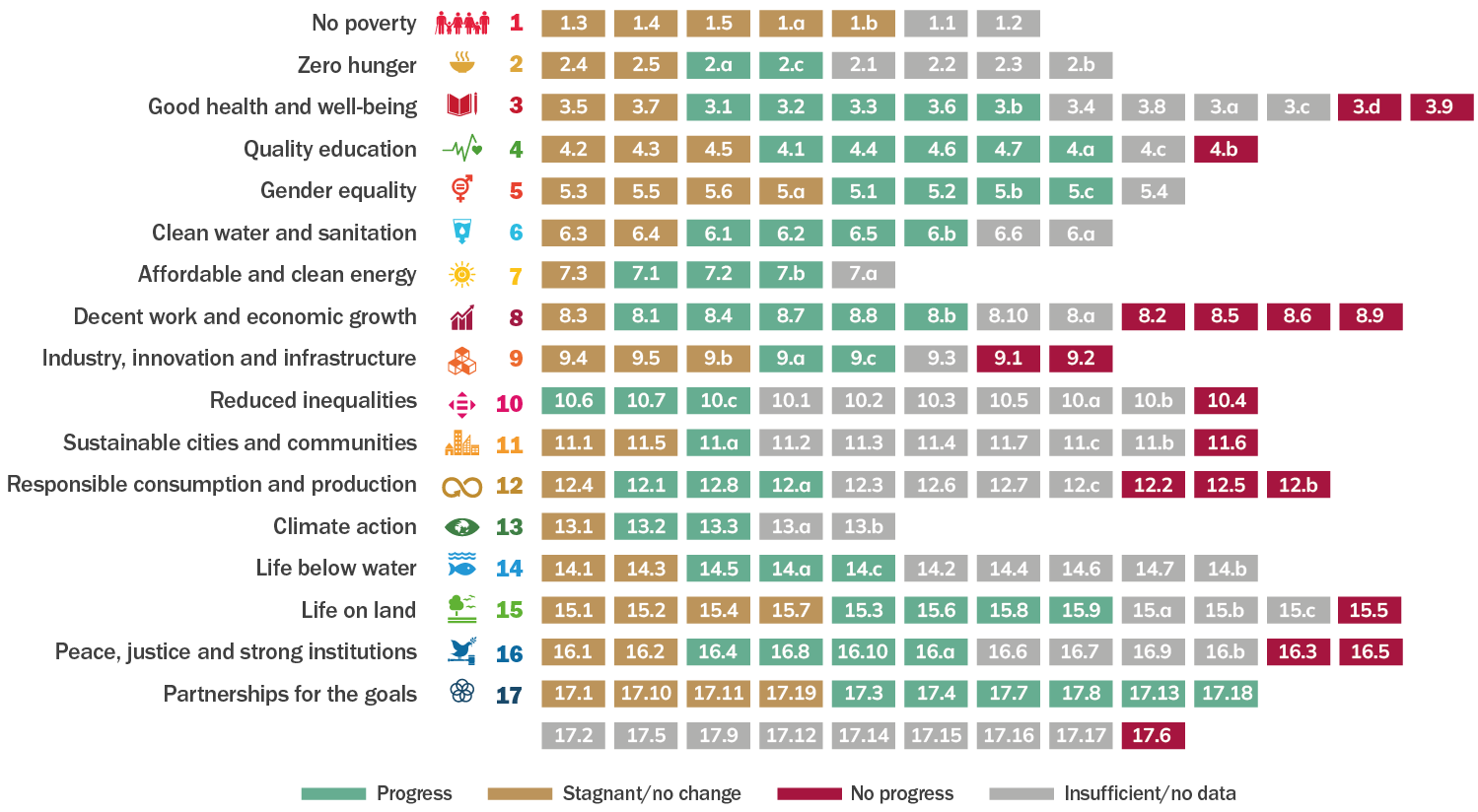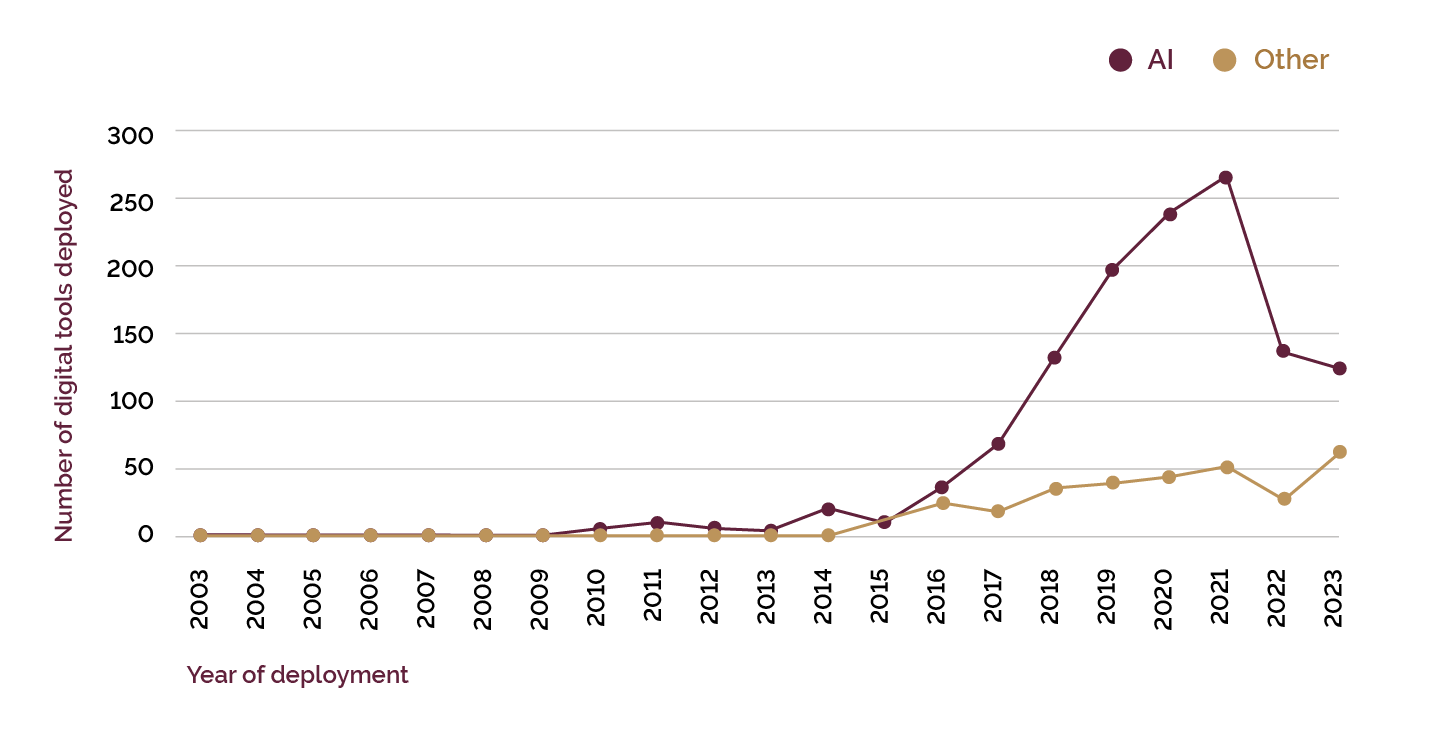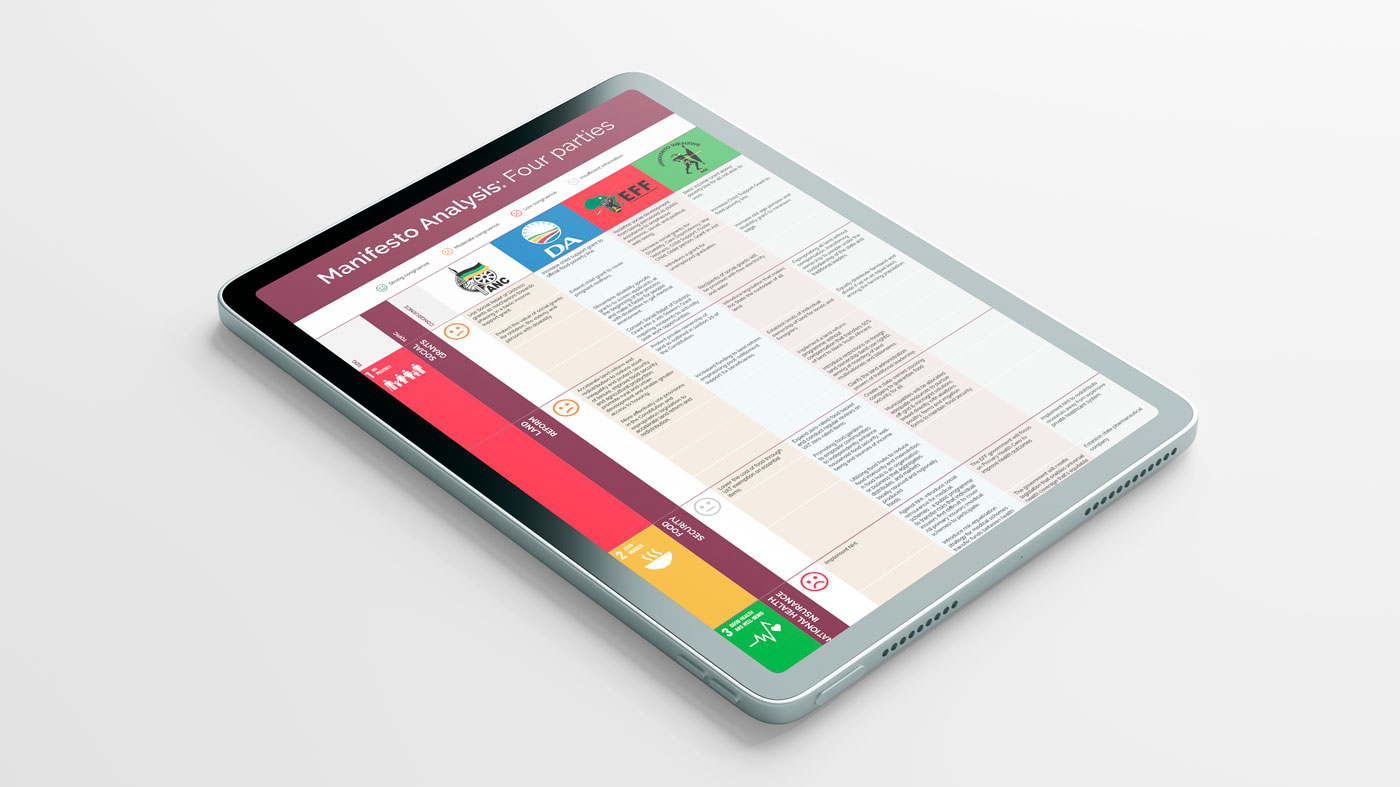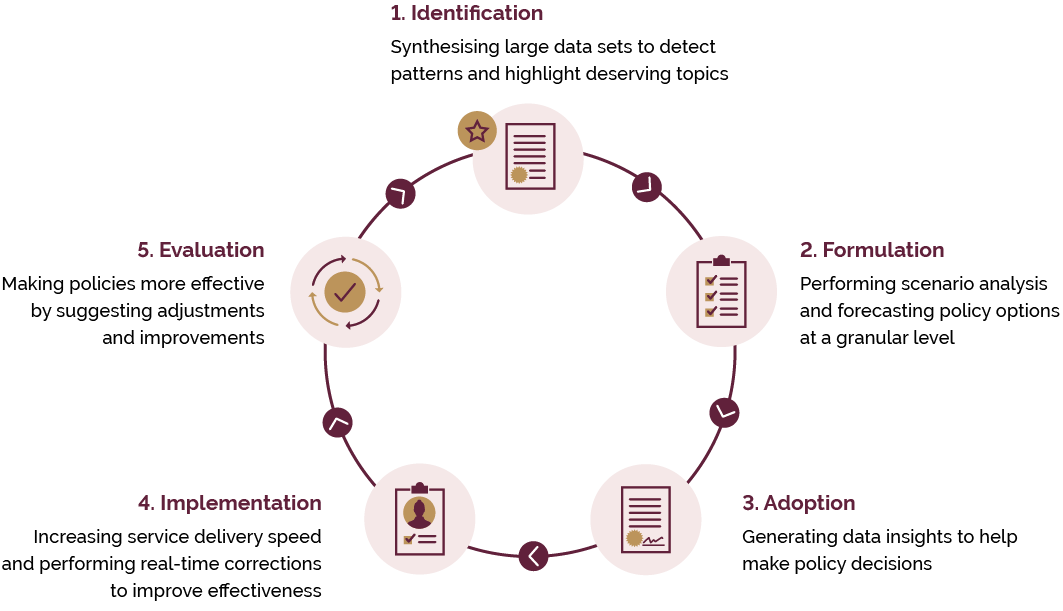Big data for smarter policy decisions
Anél Lewis

Illustration: Ronel van Heerden
Artificial intelligence (AI) and data science have a critical role to play in policy decisions around an array of topics, be it public health, smart cities, or sustainable development.
Stellenbosch University (SU), through a partnership with the Presidency, the German government, and the Bill & Melinda Gates Foundation, has established Africa’s first Policy Innovation Lab. Housed within SU’s School for Data Science and Computational Thinking, the Lab is led by Prof Willem Fourie, an associate professor in the School and Chair of Policy Innovation at SU.
Researchers in the Lab are exploring how data science and AI tools can be deployed within a policymaking environment to accelerate the achievement of the United Nations’ 17 Sustainable Development Goals (SDGs) in South Africa and beyond. “Our entry point to the SDGs is SDG 17*, particularly its focus on the importance of policy coherence and policy coordination. This is why the Lab’s current projects focus on improving coordination and efficiency in the country’s policymaking, and on reducing duplication and policy conflict through the application of data science and AI tools and approaches,” explains Fourie.
The Policy Innovation Lab is in expert hands as Fourie is the founder of one of the world’s largest AI-powered knowledge resources on the SDGs: the South African SDG Hub. This metaplatform aggregates the most relevant research on the SDGs from both local and a selection of non-South African universities.
With a background in the social sciences, Fourie’s interest in public policy started with his master’s degree and later his doctorate at SU, which centred on the interaction between religion and public policy. He later expanded his research to explore the role of leadership in effective policymaking. During this time, Fourie developed a data science team and also co-founded a tech startup that uses AI to analyse policy-relevant documents.
He has also worked for a global technology company, which deepened his knowledge of the technologies available for applying data science approaches to qualitative research. Moreover, Fourie has worked with policymakers in the United Nations, the African Union, the European Union (EU), the Organisation for Economic Co-operation and Development, and the South African government.

Prof Willem Fourie | Photo by Stefan Els
Big data and public service
Although it has only been a few months since its official launch, the Lab’s contribution to society is already evident across several fields, from politics and digital transformation to sustainability. Many of the Lab’s projects are conducted in co-operation with the Policy and Research Services branch in the Presidency, its government partner.
At the Lab’s official launch, Thulani Mahlangu, chief technical officer of the Deutsche Gesellschaft für Internationale Zusammenarbeit GmbH, noted: “The Policy Innovation Lab reflects our shared vision of innovation and inclusivity.” Ultimately, through its partnerships, the Lab will help drive the digital transformation required to improve South Africans’ quality of life, said Lawrence Matemba, chief policy analyst in the Presidency.
In a recent study, Stellenbosch Business School graduate Jan Hofmeyr noted that, if applied correctly, AI can significantly improve government services.
“The rapid growth in the range and capabilities of AI will, in coming years, present the government with ever-expanding opportunities to improve the reach and quality of services to South Africans. If they leverage it wisely, this could hold promise for South Africa, and other developing countries, to leapfrog stubborn, often structural developmental challenges,” he said.
Using the study as a platform to make recommendations to the government on its approach to AI, Hofmeyr calls for research and development initiatives to “nurture national expertise in the development of AI applications that can respond to these challenges”.
The Policy Innovation Lab has already identified several applications of AI tools for policymakers in South Africa that could have far-reaching implications for communities. For example, millions of litres of water could be saved by using monitoring hardware that alerts authorities when water leaks need to be repaired. Similarly, AI systems could be used to balance intermittent energy supply and demand. AI can even play a role in road maintenance — video footage from police dash cameras could be used by AI systems to identify potholes and other infrastructure issues.
Multiple applications
The work being done in the Policy Innovation Lab has multiple applications across disciplines. The Lab recently released a briefing note to the national government, proposing a framework for digital transformation in South Africa’s public sector. By doing so, it intends to support South Africa’s complex digital transformation to ultimately accelerate the achievement of the country’s SDGs.
South Africa’s progress towards achieving the SDGs

South Africa’s progress towards meeting the UN’s SDGs, as measured at the halfway mark of Agenda 2030. Positive trends have been observed in the case of 33% of the targets, 23% have seen no noticeable change, and 11% have not seen any progress. Note that 33% of the SDG targets did not have sufficient or new data for tracking progress. | Image courtesy of Statistics South Africa
Data availability
There is currently data available for 160 indicators. The Global SDG framework has 247 indicators. You can hover a square to get more information about the particular indicator. A grey square means that there is no data available for this indicator yet in Goal Tracker. | Image courtesy of South Africa Goal tracker
160/247
indicators available for South Africa
64.8%
overall indicator coverage in Goal Tracker
17/17
goals with data for at least one indicator
To increase public sector trust in the use of AI, one of the Lab’s teams, led by Dr Gray Manicom, has compiled an online catalogue of AI tools. “This searchable catalogue benefits both the government and businesses seeking to leverage AI in the South African public sector by helping them find cases in which AI is currently being used overseas,” explains Manicom. “By primarily considering AI tools currently used in the EU, which is renowned for having the best regulations for AI, and by citing real-life applications, we can increase public trust in and a better understanding of AI use in the public sphere.”
The catalogue, based on the Public Sector Tech Watch dataset of digital tools used in the European public sector, will be updated biannually as more cases come to light during the Lab’s work. It includes a filtered list of only those tools deemed relevant to the South African context.

Plot of the number of artificial intelligence and other digital tools deployed in the European Union since 2003, according to the Public Sector Tech Watch’s catalogue, May 2024. | Image courtesy of the Policy Innovation Lab
The digital toolbox includes tools for communication between government and citizens, analysis and monitoring, administration, fraud detection, and a wide array of many other applications. “We tried to be as pragmatic as possible, considering the relatively high needs of South Africa and the relatively low digital skills and infrastructure in government, and highlighted several noteworthy examples in our latest catalogue,” adds Manicom.
In crime prevention, for instance, the potential gains of AI systems are “massive”, he notes in this publication. Such systems may be able to predict instances of criminality without systemic or demographic bias. AI has valuable applications in fraud detection too. Comprehensive datasets of financial transactions in the public sphere can be used to train a model that can detect fraudulent transactions in near-real time. Fraud detection AI software is already used by banks and large corporations — the government could do the same.
Comparing political manifestos
The Policy Innovation Lab also analysed the manifestos of the four largest political parties that contested the recent national elections.
Fourie says there were some methodological challenges during the analysis. “Each manifesto had a unique structure and internal logic, making direct comparisons challenging. We had to develop a system to cluster topics thematically without relying on the individual logic of any one manifesto,” he explains.The team mitigated these obstacles by employing the 17 SDGs as a framework for clustering topics. As an international development agenda that South Africa subscribes to, the SDGs provided a consistent basis for comparison.

Interested in what the largest political parties in South Africa agree on, and where they differ? The Policy Innovation Lab recently took a deep dive into the manifestos of the four biggest parties. To read more about the manifesto comparison, click here.
Systems thinking, big data, and policy
As the custodian of the South African network of the Bill & Melinda Gates Foundation’s Goalkeepers initiative — a project aimed at amplifying stories on SDG impacts from across the country — the Policy Innovation Lab has a strong focus on the societal footprint of AI in policymaking.
By hosting events and workshops, the Policy Innovation Lab supports the South African Goalkeepers community in building a cohesive network to champion the SDGs. Its first session, held earlier this year, highlighted the importance of empathy and crafting solutions to meet the specific needs of one’s target market. The focus was on how to incorporate design thinking — a collaborative process involving designers and users — into the Goalkeepers’ processes.
Cross-border collaboration
Through the Policy Innovation Lab, SU has also joined one of three new Africa-Europe Clusters of Research Excellence (CoREs), launched by the African Research Universities Alliance and The Guild of European Research-Intensive Universities. The Lab is part of the cluster focusing on the politics of sustainable development.
One of the cluster’s projects, proposed by Fourie, aims to harness the potential of machine learning tools in analysing publicly available South African policies and legislation on sustainable development. “By leveraging machine learning, the project aims to transcend traditional research methods and existing policy databases, enabling a comprehensive examination of potential synergies and conflicts within the policy landscape,” noted CoRE co-lead Prof Dan Banik of the University of Oslo.
Researchers will investigate the effectiveness of using machine learning to analyse sustainability policy coherence, identify priority topics that may promote policy coherence, and reflect on the relevant ethical considerations around responsible implementation and capacity building for future policymakers. With the initial analysis completed, the team is now focused on interpreting the data.
“This partnership [of CoREs] exemplifies our shared commitment to leveraging research and innovation to address pressing global challenges. We look forward to working with Prof Fourie and colleagues on issues related to sustainable development so that we can shape a more sustainable and equitable future for all,” says Banik.
Artificial intelligence has a role at every step of policymaking

Image courtesy of the Boston Consulting Group
Big data and policy directions
- Digital transformation can support the achievement of local, national, regional, and global development priorities. It has been argued that 70% of all SDG targets globally will benefit from data and digital technologies, while 13% of the targets call directly for the use of these technologies.
- The question of whether AI could support policymaking is now more prominent than ever in governments around the world. A report published in 2023 showed over a third (37%) of United Kingdom government bodies to be actively using AI, and a further 37% to be actively piloting (25%) or planning (11%) the use of AI.
- The results of a 2020 survey revealed that most Europeans (51%) supported the idea of reducing the number of parliamentarians in their countries and replacing them with an AI algorithm. Younger generations particularly support this, with 60% of 25–34 year olds in favour.
- This shift is seen as a necessity, as policymakers are increasingly facing rapidly changing, complex, global, and interconnected challenges that are difficult to understand and tackle without relevant datasets, scientific evidence, scenario-analysis tools, and the help of AI. Climate scientists, for example, rely on computer simulations to forecast future climate scenarios and inform policy decisions, as evidenced by the consistent use of these tools by the Intergovernmental Panel on Climate Change in their reports over the last 20 years.
- In 2023, the Central Digital and Data Office of the UK estimated that almost a third of tasks in its government could be automated.
- Experts predict that the use of AI will contribute up to $15.7 trillion to the global economy by 2030.
Sources: The Policy Innovation Lab, the Joseph Rowntree Foundation and the Center for the Governance of Change

The research initiatives reported on above are geared towards addressing the United Nations’ Sustainable Development Goals numbers 9, 11 and 17, and goals number 4, 7, 11, 12 and 13 of the African Union’s Agenda 2063.